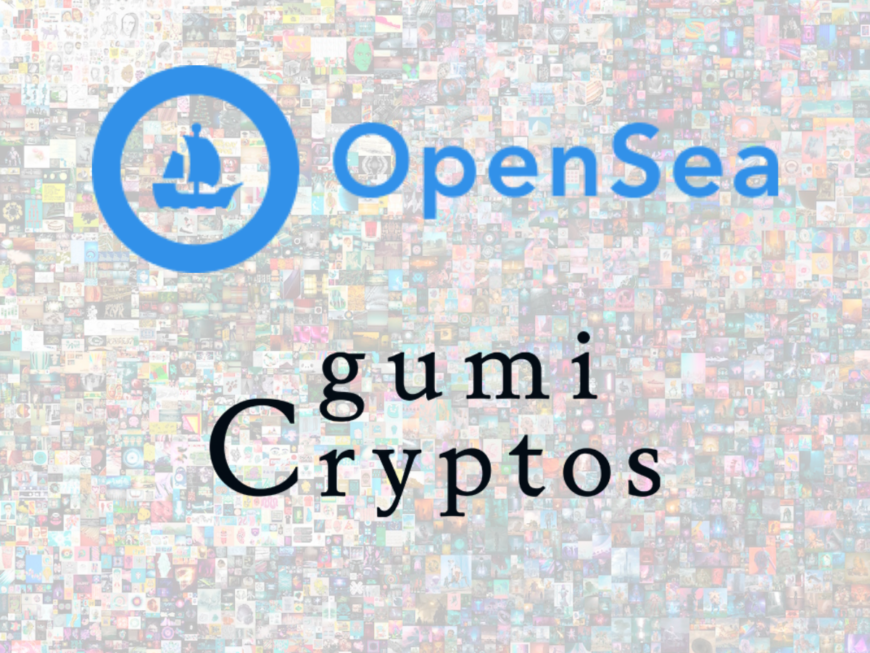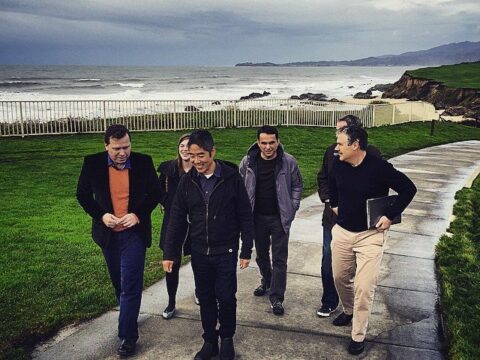
By Miko Matsumura, Evan Mair and Ray Zhang
Today, our portfolio company, OpenSea announced a $23M funding round led by Andreesen Horowitz (A16z). Joining the OpenSea family are Naval Ravikant, Mark Cuban, Tim Ferris, Belinda Johnson, Ben Silbermann, Alexis Ohanian, Balaji Srinivasan, Standard Crypto, Linda Xie, Avichal Garg, Flamingo DAO, 3LAU, RAC, Justin Kan, Andrew Steinwold, Metapurse, Bill Lee, 1Confirmation, Pascal Capital, Blockchain Capital, Regan Bozman, Kevin Hartz and Dylan Field from Figma.
Katie Haun from A16z explained why they led this round:
OpenSea provides the link between the consumer layer and the infrastructure layer for the digital goods economy and is a key utility in this new world of digital ownership. OpenSea provides a one-stop shop to discover, buy, and sell any non-fungible digital asset that conforms to a popular standard like ERC721, and it also quickly tells you the “who, what, when, where” about a particular NFT. OpenSea shows you the provenance, trading, and sales history of digital items in a readable, trusted way.
Katie Haun’s blog post on their investment in OpenSea
Triple Giant: the Google, Ebay and Unity of NFT
When we looked at the entirety of business, we realized that position they were establishing was not 1 dimensional, it was a multi-platform opportunity; we saw OpenSea as a combination of Google, Ebay, and Unity.
- Google’s indexing and search capabilities — OpenSea has over 14M assets indexed with searchable tags (metadata), and tracks every listing, bid, sale, and transfer (even on other platforms) while offering an API for wallets to support these assets and data
- Ebay’s marketplace functionality — With the ability to sell, auction, make offers, and barter, OpenSea matches Ebay’s functionality and takes it further allowing crowd and pre-sales, whitelisting and customization of marketplaces, and creator determined fees
- Unity’s developer functionality — OpenSea helps developers throughout the lifecycle of building an open economy with their SDK, allowing devs to port their in-game assets on-chain (mint), distribute them (sell), and run markets (managed marketplace) in-game
These platform players are the ones that potentially have the largest amount of leverage in the space, especially with the relationships Devin and Alex had built — which created a venture opportunity.
Furthermore, as with all gCC investments, we gained conviction around the team.
Miko Matsumura, General Partner at gCC recalls his impressions of the founders, when he met Alex Atallah at his crypto underground meetup that he co-founded in San Francisco, this way:
“Devin and Alex are both extremely energetic and very hard working and true entrepreneurs — part of the initial traction that they had was through fairly aggressive outreach to anyone who was in the early Ethereum and NFT sub-community. They had a business development mindset driving their actions, and you’d be hearing directly from them when they wanted to work with you, so they built the relationships important to thrive in this ecosystem. Given their execution and passion and how early they were, we thought they could occupy a central and fundamental position in the NFT ecosystem.”
Here is an episode of the MikoBits show where Miko interviews Alex Atallah, CTO and co-founder of OpenSea.
When gCC invested in OpenSea
When we first invested in OpenSea in Mid-2019, they were doing about $500k in monthly volumes. Alex and Devin had built a market leading product that was the go-to for anyone transacting with NFTs; for us, this was the perfect time to invest, as we had conviction that they would flourish and continue to lead the market with their superior product (and customer service/relationship building) whenever demands rose. Over the last few months, that demand has been obvious, and OpenSea’s volumes have flourished, surpassing $95M in Feb:
Monthly Volumes (Source: Richard Chen)
Daily Volumes (Source: Richard Chen)
As new users discovered NFTs as ways to connect with their favorite artists, musicians, and other community members, they piled into the space, many landing at the door of OpenSea:
Total Users (Source: Richard Chen)
The future of NFT:
Blockchain will swallow the value of all financial assets. NFT will swallow the value of all intellectual property. We are in the early days of both.
“NFT” like many things in crypto is a bad name. What we are seeing is an interaction between ETH standards like ERC 721 and others (more on this in a bit) and smart contracts. Therefore right now, we see the clear winner of NFT as ETH NFT as much as we see the clear winner of DeFi being ETH DeFi.
We believe this trend will continue as the use cases for NFTs beyond art and speculation start to establish themselves. While we may be forming a short term bubble, NFTs as a class can’t be underestimated in their applications and the TAM of their use cases, which include enabling the creator to fan economy, a revenue stream for a multitude of to-be-seen IP (we won’t stop at the NBA), and structured financial products. NFTs are just another standard — ERC-721 and ERC-1155 (with new interesting applications unlocked through proposals like EIP-2615) — and just like ERC-20 has provided incredible value for the Ethereum ecosystem, these standards will as well.
One of the things that’s inherent in the internet is the idea that it’s based on abundance of data, and that ultimately, all data is copied and pasted: I send you data, I still have the data, and now you have a copy of the data. And unfortunately, the result of that is that the infrastructure doesn’t respect intellectual property rights, it has no concept of people owning their own data, and the privacy use case is not respected.
Long term, all forms of intellectual property ownership of all forms of rights management, including software licenses, and essentially all forms of data become owned and licensed by the creators.
gCC views blockchain as an “Internet of Value” play and as such anything and everything of value can be exchanged, starting with tokens and digital currencies (so the DeFi use case) and growing to all digital Intellectual Property (IP) including art, gaming, collectibles, domains, software licenses, music, movies, books and anything you can put on the Internet. Eventually it may make sense for digital identities and user data can be made private and we rebuild the Internet that way.
So Blockchain creates an internet that respects Intellectual Property at its core. This was the subject of a discussion with Jake Brukhman from CoinFund (who is a leading proponent of NFT use cases) on the MikoBits show.
Here is the show with Jake who is a great intellectual leader in NFT:
Eventually, NFT becomes a way of representing authenticity, through ownership and scarcity, as opposed to the fungible tokens, which represent sort of these atomic financial infrastructures that we need to build this new internet.
Disclaimer
Information is provided for general educational purposes only. This presentation is not an offer to sell securities or a solicitation of offers to buy securities. Nothing contained herein constitutes investment or other advice nor is it to be relied on in making an investment decision. For more important information, please see disclaimer



